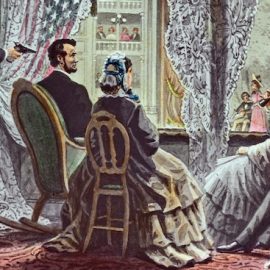

This article is an excerpt from the Shortform summary of "Where the Crawdads Sing" by Delia Owens. Shortform has the world's best summaries of books you should be reading.
Like this article? Sign up for a free trial here .
Who is Sheriff Jackson in Where the Crawdads Sing? What’s his role in the story, and Kya’s trial?
Sheriff Jackson in Where the Crawdads Sing leads the way in Kya’s arrest. Sheriff Jackson immediately suspects her, and then pursues her relentlessly as a suspect. He also testifies against her at her trial.
Sheriff Jackson Has Early Suspicions About Kya
Something was off about the scene where Chase was found. There were no footprints in the mud near the body. In fact, the only footprints they could find were their own and those of the two boys. Not even Chase’s footprints existed. How could that be?
The first order of business was to inform Chase’s family of his death. Then, his body was transported to the morgue for an autopsy. Sheriff Jackson told the doctor not to mention anything about Chase’s death or the strange circumstances to anyone in town.
Soon, Deputy Joe Purdue arrived, and the men went about investigating the scene. They were reluctant to call it a murder just yet, but they both agreed it was starting to seem like it wasn’t a freak accident. They photographed the body and surrounding mud. They climbed up the fire tower stairs and saw that one of the grates on the far side was open. Sixty feet below the open grate sat the outline of Chase’s body.
The open grate was odd. People might forget to close the grate over the stairs, but it was unusual for any of the other grates to be opened, let alone left open. Joe questioned why someone would leave the grate open if they had pushed Chase into the hole, but Ed understood. If someone wanted his death look like an accident, the grate had to be open.
For two hours, Ed and Joe collected fingerprints from the grate, the stair railing, and anything else someone might have touched. They collected blood and fiber samples from broken beams that had snapped as Chase fell through. They had everything they needed to start the investigation except a suspect and motive. True, Chase was wild and known as a Tomcat with the ladies, even after he was married. There were plenty of people who might have had a grudge against him, but how many of them would take it as far as murder?
Although these witnesses’ testimonies painted a bad picture regarding Kya’s guilt, Tom was not deterred. He questioned each witness expertly, creating doubt about their statements.
- Rodney Horn admitted it was possible that Kya was in trouble and defending herself when they saw her kicking Chase.
- The coroner admitted that Chase’s injuries would be similar if he’d simply fallen. He also said that fibers can stay on a jacket, even with washing, for years.
- Sheriff Jackson was forced to defend the logic regarding the lack of evidence. There was no indication that footprints or fingerprints had been destroyed and it was possible the tide had washed out the footprints Chase had made. There was also no real evidence whatsoever that suggested Kya was at the tower. The last blow to the sheriff’s testimony was a letter he’d written to the Forest Service three months prior asking for the tower to be fixed. The letter stated that the open grates were hazardous, and if something wasn’t done, a tragic accident could occur.
- Mr. Price admitted that he hadn’t thought the man on the bus was wearing a disguise until the sheriff suggested it and stated that the bus was late arriving to Barkley Cove that night. It was scheduled to arrive at 1:15 am but didn’t arrive until 1:40 am.
- Mr. King reiterated that Kya was not on the bus returning to Greenville and that there were no other buses making the trip that night.
The Sheriff as a Witness
In the afternoon, with only two witnesses for the defense left, Kya started to unravel. Where, once, she was able to distract herself with thoughts of marsh life, now she was consumed with images of prison and her possible death sentence. She crumbled into her hands, prompting Tom to call a recess.
Kya begged Tom to go on without her. She couldn’t sit in that courtroom one more minute. But she had to attend by law, and it was easier for a jury to find an absent defendant guilty. When Kya went back to the courtroom, her mind drifted in and out of reality, and she could no longer focus on what was being said.
Tom recalled Sheriff Jackson and questioned him about the timing of Kya’s crime. With the testimony that the bus was late, the time it would take her to get to her boat, ride to the tower, perform the murder, and get back to the bus station was one hour seven minutes. But the bus to Greenville left fifty minutes after she would have arrived. There simply wasn’t time to do everything needed to commit the crime.
Ed speculated that she could have saved a minute or two here or there if she’d jogged, but he was flustered. The sheriff also suggested that maybe she hadn’t taken the boat. Maybe she’d run from the station to the tower by foot. At the prosecution’s table, Mr. Chastain burned with fury. The sheriff was dismantling his theory.
To make up lost ground, the prosecutor explained that the water surrounding Barkley Cove was often caught in riptides and undertow currents that caused it to move faster. Someone could have taken advantage of a riptide and traveled to the tower faster than normal. But the sheriff had no proof that these events had occurred on the night in question.
The End of a Career
Kya’s supporters, including Scupper, who’d shown up in court a few days earlier to support his son, were impatient for the verdict. Tom told them he couldn’t predict how long the jury would deliberate or what their verdict would be but reminded them that even with a guilty verdict, the fight wasn’t over.
The jury asked for documents twice. The first was the bus drivers’ transcripts. The second was the coroner’s transcript. The hours dragged, and as her support team sat unsettled, so did Kya in her cell. She had lived a life of loneliness, but waiting for the verdict created a sensation like she’d never known. Thinking of never seeing her beautiful marsh again made her feel more alone than before.
At four o’clock the same day, the jury had a decision. Tom delivered the news with a solemn expression. A verdict this fast didn’t bode well for Kya. The townspeople clustered back into the courtroom, which was at capacity within ten minutes.
Judge Sims asked Kya to rise. Jumpin’ and Mabel clasped hands. Tate leaned as far as he could toward Kya’s back. The energy in the room had shifted from before. The salivating eagerness of community to condemn Kya was gone. Now, most people stared at the floor. Tom’s words had shown them their folly.
When the verdict of not guilty echoed through the breathless courtroom, everyone had different reactions. Kya’s supporters gasped with relief, cried, and hugged. Other’s comforted a sobbing Patty Love. Some grew angry, demanding an explanation and pointing the finger at the ineptitude of Sheriff Jackson. Others showed a similar disappointment, but inside, they were overjoyed. These few included Mrs. Singletary, Mrs. Culpepper, and Pansy Price. Soon, the roar died down, and people left the courthouse to return to their regular lives.
After the trial, many of the townspeople believe Sheriff Jackson treated Kya unfairly. Sheriff Jackson was not re elected.

———End of Preview———
Like what you just read? Read the rest of the world's best summary of Delia Owens's "Where the Crawdads Sing" at Shortform .
Here's what you'll find in our full Where the Crawdads Sing summary :
- How Kya Clark's abandonment as a child affected her through her entire life
- How Kya discovered love despite steep obstacles
- The murder trial that embroiled Kya's town, and the ultimate truth behind the murder






